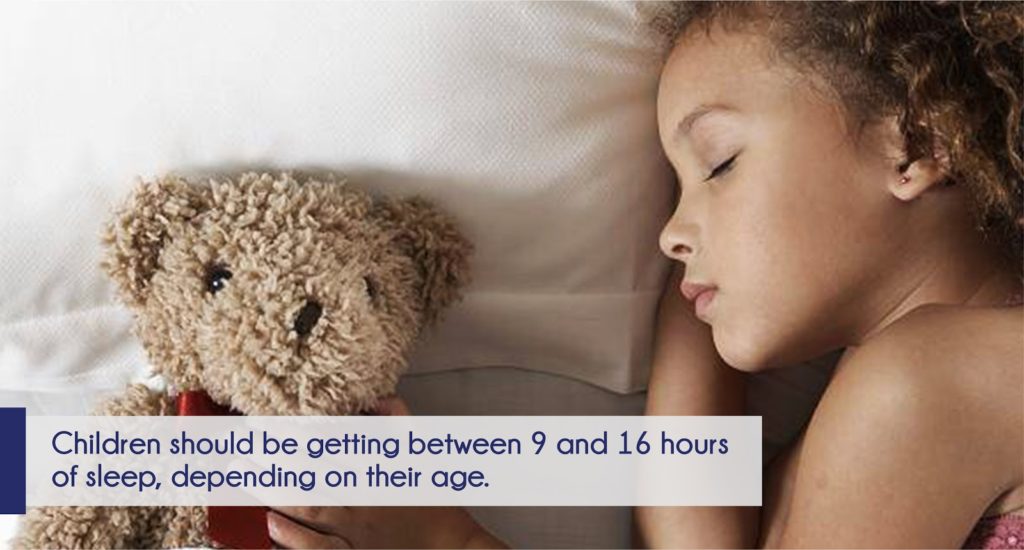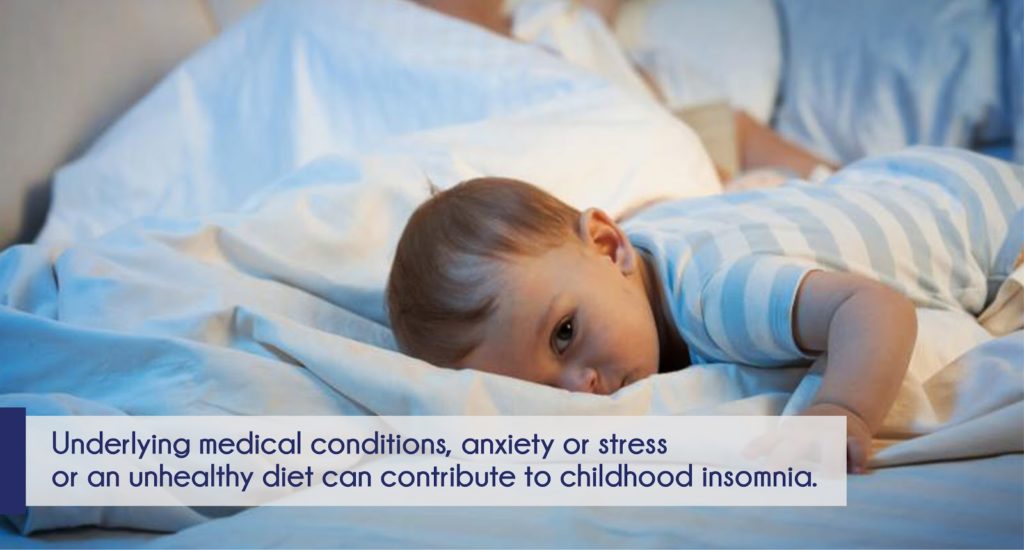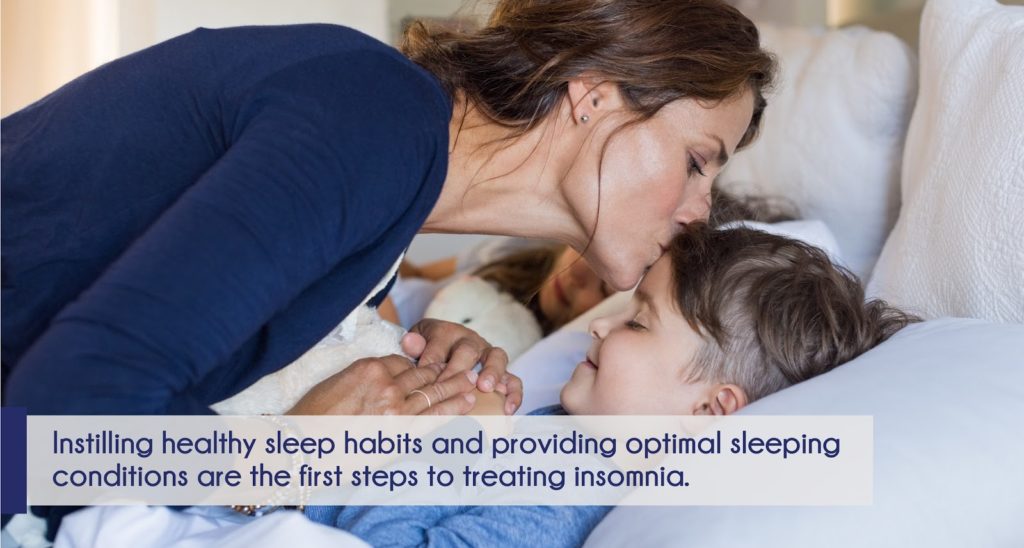Insomnia is a sleep disorder in which a person suffers from sleeplessness. That is, the affected person can’t sleep or wakes up in the night and has trouble falling back to sleep.
Many adults suffer from insomnia, but did you know that children can suffer from insomnia too? Here we’ll cover the different ways that insomnia can manifest in children as well as signs and symptoms to look out for. Finally, we’ll talk about how childhood insomnia is treated.
Insomnia in Children

Children can suffer from acute and/or chronic insomnia. Insomnia among children is a growing concern for both parents as well as the medical community, due to a lack of research on the subject matter.
Causes of Insomnia in Children
Childhood should be a time of carelessness, children shouldn’t have to focus on anything except sleeping, eating and playing. But, not all children are so lucky.
According to the University of Michigan’s School of Medicine, if something traumatic and/or abnormal happens to a child it can impact their sleep cycle. There are also more mundane reasons children may have trouble sleeping.
Here are some of the most common causes of sleeplessness among children:
- They are wearing irritating and itching clothes.
- They are experiencing restricted bowel movement.
- They were born prematurely (sleep issues are common in premature babies).
- There were complications at birth (this can also lead to difficulties with the sleep cycle).
- Interestingly, breastfeeding can also have an impact on their sleep cycles.
- If they feel hungry at night. Young children (especially aged between 0-3 months) get hungry throughout the night, so they need to be fed all night long.
- They live in a house with family members that are often stressed, distressed or fight often.
- The child may be allergic to a food or food formula and isn't able to explain how they are feeling.
- They may suffer from some airborne allergies that cause sleepless nights.
- The child may suffer from separation anxiety.
- They may have colic, that is, may suffer from gastrointestinal issues.
- They could be continuously in the light sleeping phase and little noises may cause him or her to wake-up.
- If the child often wets the bed, it may disrupt their sleep.
- The child may be having nightmares.
- If they suffer from any physical pain, such as toothache, growing pains a tummy ache, etc.
- They might not feel comfortable in their physical surroundings.
How Much Sleep Is Healthy for Children?

Parenthood can be an overwhelming period in a person's life. One of the largest parts of becoming a new parent is figuring out how to parent and figuring out how much to feed your child, how much they should sleep and other vital things.
Oftentimes, parents don’t know if their child is crying because they’re hungry or sleepy. For the most part, the best way to go about this is trial and error until your child is satisfied.
However, it can be helpful to have a baseline of knowledge to help decide how much your child should be sleeping.
Below, The University of Michigan’s School of Medicine has developed a sleeping table that tells the average sleeping time for children and young adults.
|
Age
|
Nighttime Sleep
(hours)
|
Daytime Sleep
(hours)
|
Total Sleep
(hours)
|
|
One month
|
8.5 (many naps)
|
7.5 (many naps)
|
16
|
|
Three months
|
6-10
|
5-9
|
15
|
|
Six months
|
10-12
|
3-4.5
|
14.5
|
|
Nine months
|
11
|
3 (2 naps)
|
14
|
|
12 months
|
11
|
2.5 (2 naps)
|
13.5
|
|
18 months
|
11
|
2.5 (1-2 naps)
|
13.5
|
|
Two years
|
11
|
2 (1 nap)
|
13
|
|
Three years
|
10.5
|
1.5 (1 nap)
|
12
|
|
4 years
|
11.5
|
0
|
11.5
|
|
Five years
|
11
|
0
|
11
|
|
Six years
|
11
|
0
|
11
|
|
Seven years
|
11
|
0
|
11
|
|
Eight years
|
10-11
|
0
|
10-11
|
|
Nine years
|
10-11
|
0
|
10-11
|
|
Ten years
|
10
|
0
|
10
|
|
11 years
|
10
|
0
|
10
|
|
12-13 years
|
9.5-10
|
0
|
9.5-10
|
|
14 years
|
9.5
|
0
|
9.5
|
|
15 years
|
9.5
|
0
|
9.5
|
|
16 years
|
9.25
|
0
|
9.25
|
However, the University also stresses that every person and child has a unique and different body, and thus needs to sleep accordingly.
So, this table is a helping tool, but always trust your gut or consult your doctor if you notice something unusual in regards to your child’s sleep schedule.
Symptoms of Insomnia in Children

Sleep depravity poses a severe threat to our mental and as well as physical well-being. Children will especially suffer if and when they're sleep-deprived. Here are some of the effects of sleep deprivation in children.
- Sleep-deprived children often suffer from mood swings; they are typically very cranky.
- They often feel tired or lethargic.
- Sleep-deprived children often have a higher risk of gaining weight than normal sleepers.
- On the other hand, some will lose their appetite.
- They don’t grow properly or you may notice that their physical health deteriorates.
- They are unable to concentrate on tasks for very long, or they have a short attention span.
- They often lag in academic activities or may struggle in school.
A sleep-deprived child can become extremely hard to handle since they’re cranky and short of temper. This can cause parents to lose out on their sleep, which proves to be detrimental for their health. It can start a vicious cycle of sleeplessness that can be very frustrating.
Signs Your Child May Have Insomnia

As a parent, you're expected to know everything about your child, but unfortunately children don't come with manuals. That being said, how do you decipher if your child is having some sleep issues or is an insomniac?
After extensive observation and studying, the Children’s Hospital at Boston has come up with some observable signs that can help you identify whether your child is suffering from insomnia.
- The child very often refuses or struggles to get out of bed.
- The child is resistant to waking up for school or other early engagements.
- The child seems overly groggy or lethargic in the morning.
- The child has a difficult time falling asleep when laying down for bed.
- The child often wakes up during the night.
- The child finds it difficult to adhere to a sleep routine or schedule.
- The child dislikes napping or has difficulty napping.
These symptoms are called ‘night-time symptoms.' There are also symptoms that sufferers will feel during the daytime. Some of these odd day-time habits are as follows:
- The child complains of being tired all day or experiences fatigue all-day.
- The child suffers from memory impairment or seems overly forgetful.
- The child’s academic, personal and social lives seem to be suffering.
- The child often gets irritated by the smallest things, such as a person talking loudly or a pet, etc.
- The child is not as motivated as they once were.
- The child’s tolerance levels continue to decline.
- The child’s reflex response worsens day by day.
Causes of Insomnia in Children

Studies by medical universities and various research institutes suggest that insomnia is not just an elderly disorder; instead, children can also suffer from it.
But, the most intriguing and essential question is — why? That is what causes this disorder in children?
Well, the answer is neither simple nor straightforward. There’re a plethora of reasons for it.
- Some disorder, sleep or otherwise
- Anxiety or stress
- An underlying medical condition, such as ADHD, asthma or autism
- Some medication that may cause the sleep cycle to change
- Too much caffeine (which is present in almost every soft-drink)
- Too many sugary foods
- Any change in their routine
Diagnosis of Childhood Insomnia

Unlike many sleep disorders such as sleep apnea etc. insomnia doesn't have a diagnostic test or a mechanical diagnosis.
Instead, the medical community relies on the patient’s testimony and the observations of family members when diagnosing insomnia.
Or, if a hospital is well-facilitated, the patient is kept in a sleep lab where his or her habits are observed for a specific time to confirm the diagnosis and to eliminate other possibilities.
Treating Insomnia in Children

Treating insomnia in adults is very easy. There are many medicines and drugs available in the pharmacy market that can tone down insomnia in adults.
Benzodiazepines are sleep-inducing drugs that are often used to treat sleep and psychological disorders, such as depression, anxiety and insomnia in adults.
One of the most common problems of treating insomnia in children, however, is that there hasn’t been much research done on the subject.
Current Challenges
An article was published in Pediatrics — a journal that focuses on children's issues and health — in 2006, observed and stated that pediatric insomnia is not considered a disorder; although, it should be.
Also, both the Federal Drugs Agency (FDA) and pharmaceutical companies should pay immediate attention to this issue and should focus on developing drugs that can help cure insomnia in children.
The paper also urges concerned authorities to devise a proper framework for ethical clinical trials involving children and young adults (teenagers).
Natural Ways to Encourage Better Sleep

Since the FDA hasn't approved most Benzodiazepines for children, parents are often encouraged to employ alternative ways of dealing with pediatric insomnia. Here are some ways to manage behavioral insomnia in children.
1. Inducing Healthy Sleeping Habits in Children
Train your children to go to bed early. Discipline them to a sleeping schedule from an early age.
Parents have to be firm and strict with their children, not allowing them to read or use technology in bed. Good sleeping habits also include disciplining your child into going to bed at a specific time, even on holidays and weekends.
2. Provide a Comfortable Sleep Environment
Sometimes, children aren't able to sleep because the bed is either too cold or hot. It’s advisable that the bedroom temperature be maintained between sixty and sixty-seven degrees Fahrenheit (60-67 F).
The temperature of the room should be around seventy-five degrees Fahrenheit. Children are often afraid of the dark, so it’s best if you keep a night light in their room as well. The ambiance of the room should be relaxed and calm. Some smells also stimulate sleep, so put an air freshener in the room, if need be.
3. Teach Your Children to Relax
A relaxed mind goes a long way, be an adult’s or a child’s. Develop some relaxing habits in your children, for instance, yoga or encourage them to think of positive things before going to bed.
4. Remove All Clocks from the Room
Studies show that clocks may make some children anxious. Remove all the clocks from your child's room so that the ticking of the clock doesn't make them anxious.
5. Set a Bedtime
On average, children need to sleep between 9-11 hours every night. As a parent, tuck them in bed at a reasonable hour, keeping in mind their average sleep cycle.
6. Behavioral Therapy
Insomnia almost always has an underlying cause, either physical or psychological. Since there aren’t any pediatric medicines for treating this illness, try going to behavioral therapy. The therapist might suggest some relaxing exercises or provide a cognitive solution for your child’s problem.
Something to remember is that the FDA does not approve most medicines that are used to treat insomnia for children, so avoid giving any sleep-causing drugs to your kids.
The first step in curing any child insomnia should be to make sure they are sleeping on a comfortable mattress with good quality pillows and blankets.
You may want to set them up with a soft light, some soothing sounds or even some aromatherapy. If you work with your child to figure out the cause of their insomnia, you both should be sleeping better in no time.
Resources
>> How Much Sleep Do Kids Need?
>> How Long Can A Baby Sleep In A Bassinet
>> ADHD For Adults And Children

 Free delivery across US & Canada
Free delivery across US & Canada Best price guarantee
Best price guarantee Extended 120-day sleep trial
Extended 120-day sleep trial Free in-store mattress testing
Free in-store mattress testing









 Showrooms
Showrooms





Meet The Author:
Shanir Kol
Shanir Kol, founder and CEO of SleePare, pioneered the “Try and Buy” model in eCommerce, enhancing mattress shopping by combining in-store trials with online purchases. Launching in 1999, his company focuses on customer satisfaction and eco-friendly practices, aiming to minimize mattress waste and expand sustainably.